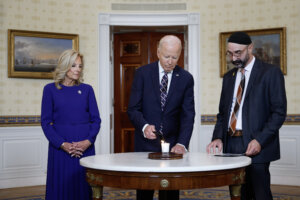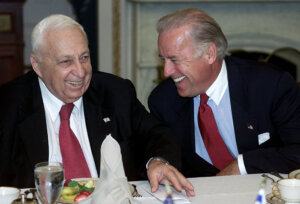How Joe Biden developed his lifelong affection for Jews
A journalist once said that a Jewish holiday should be declared to celebrate the former president

Joe Biden attends a Department of Defense Commander in Chief Farewell Ceremony at Joint Base Myers-Henderson Hall in Arlington, Virginia, Jan. 16. Photo by Getty Images
Last year, during a call with Jewish leaders for the High Holidays, then-president Joe Biden described recent American and Jewish experience as “a season of joy and pain.” As a longtime senator from Delaware, Biden stated that the “wisdom” he learned from these constituents amounted to “a delicate yet profound balance between celebration and suffering.”
Identifying affirmation and solemnity in Rosh Hashanah and Yom Kippur, Biden, who has demonstrated a career-long fraternal affection for Jews, continued, adding that “Jewish people have embodied this duality … for generations” as their “strength.” Choosing “happiness and light, despite centuries of suffering, persecution” is an “enduring lesson and legacy for the Jewish people and for all of America.”
The roots of Biden’s devotion to Jews originated in his childhood, when his father, Joseph Robinette Biden Sr., an intermittently successful businessman, impressed upon him the need to defend minority groups. As Biden often remarked, his father’s postwar “Never again” attitude about the Holocaust was allied to an early acceptance of LGBTQ+ people and other minorities. Biden associates his father with other elders who taught him the virtues of tolerance, especially toward Jews.
Tom Lantos, a Hungarian Jewish economist who survived the Holocaust with help from Raoul Wallenberg, took up politics after Biden hired him as an adviser in the late 1970s.
Lantos, who would serve in the House of Representatives, educated Biden on the subject of genocide, knowledge later applied to the massacre of civilians in Darfur by Sudanese forces. In 2007, Biden declared at a National Jewish Democratic Council presidential candidate forum: “Any country that engages in genocide forfeits their sovereignty.”
More paternal inspiration was derived from former Israeli President Shimon Peres, as Biden specified during a memorial ceremony at Adas Israel Synagogue in Washington, D.C., in 2016. Likening Peres to his father for his compassion, Biden stressed that the former believed that everyone, “Israeli or Palestinian, Jew, Christian or Muslim” was “entitled to be treated with dignity.”
As Peres did in a funeral speech for another Israeli leader, Yitzhak Rabin, Biden quoted from the Book of Jeremiah (31:16) that Jews exiled in Babylon should restrain their weeping and lamentations, as their work will be rewarded.

In the same speech, Biden drew inspiration from Israel’s founding generation of leaders for their “iron will and determination to endure” that remains an “indispensable quality of the Israeli character and well-being.”
A solid friend to the Jews in times of tragedy, Biden was lauded last year by the military journalist Anshel Pfeffer as possibly “the Jews’ greatest ever friend.” Pfeffer added: “In years to come we’ll celebrate Chag Joe Biden” Why so? Because through virtuoso diplomacy, Biden created an international coalition with Britain, France and Arab countries to shield Israel from missiles and drones launched by Iran.
Saving lives and braving hostile currents of American public opinion, Biden, according to Pfeffer, proved himself to be “the staunchest ally of the Jewish people in history,” no less.
Yet Biden was more than just a protector in dire circumstances. In a 2013 speech in Washington, D.C., on the occasion of Jewish American Heritage Month, Biden affirmed that America was built on “Jewish heritage, Jewish culture, Jewish values” so that “Jewish heritage is American heritage.”
Indeed, Biden underlined, America embraced “5,000 years of Jewish history, tradition and culture” by prizing “independence, individualism, fairness, decency, justice, charity.” Social progress has been disproportionately impacted by Jewish initiative.
In addition to welcoming immigrants, Biden noted, Jewish activists such as Jack Greenberg, an American attorney and director-counsel of the NAACP Legal Defense Fund, as well as the feminist Betty Friedan, helped society evolve. Even marriage equality might be attributed in part to the influence of Will & Grace, the TV sitcom created by two Jewish scriptwriters, Max Mutchnick and David Kohan.
Extending this identification of Judaism and Americanism, Biden mentioned distinguished Jewish Supreme Court judges as guarantors of constitutional rights.

Biden valued Jewish colleagues so much that one political writer marveled in 2021 that Biden had appointed “a minyan and a half of Jews” to his administration team. He was the first to host a Rosh Hashanah reception in the White House, after celebrating the holiday in the official vice presidential residence during the Obama administration. Biden observed Sukkot as well, and traveled with each of his children and grandchildren when they reached the age of 14 to visit Dachau concentration camp in Germany to learn about the Holocaust.
Yet cheery anecdotes also abound, such as in 2012, when he danced the hora at his daughter Ashley’s wedding to a Jewish surgeon, or in 2021, when just four days after his inauguration, Biden had his motorcade stop for his first presidential restaurant visit at Call Your Mother, an upmarket D.C. bagel shop. Or when he jestingly claimed that if ever he abandoned Catholicism, it would be to convert to Judaism.
To be sure, at times gaffes could create a fleeting ambiguity that distracted from his half-century of devotion to the Jewish cause. One such was in 2014, when as vice president, Biden deemed those who sold bad loans to service members “Shylocks,” an offensive reference to William Shakespeare’s The Merchant of Venice.
More troubling for critics of Israel, starting in 1986, Biden repeatedly opined that if Israel did not exist in the Middle East, America would have to invent it to protect U.S. interests in the region. This free adaptation of a line of verse by Voltaire, “If God did not exist, it would be necessary to invent him,” baffled some onlookers.
Voltaire believed that the idea of a God was societally useful for maintaining order. Likewise, Biden considered U.S. funding of Israel to be worthwhile (his preferred phrase was “the biggest bang for our buck”). Dissenters took even more umbrage when Biden stressed how the safety of American Jews and the Jewish people everywhere depended on the existence of the state of Israel.
Literalists claimed angrily that this implied that America could not protect its Jewish population, whereas Biden was referring to the foundational concept of Israel as a refuge for all Jews; after all, Biden has regularly termed himself an ideological Zionist and in 2016 he was given the World Jewish Congress Theodor Herzl Award.
Small wonder that journalists have alternately called him “the most pro-Israel president in American history” and “the last Zionist U.S. president.” In 2023, the Jewish public policy scholar Aaron David Miller described Biden as “a politician of a generation that probably doesn’t exist anymore.”
If his enduring identification with Jewish experience eventually made him seem outdated, Jews currently enduring an unprecedented poisonous time in the American polity might learn from Biden’s faith to restrain lamentations and believe that their work will be rewarded.
And as he commented in 2022 to Jews worldwide on Yom Kippur, the holiday is based on “the universal truth that we are all capable of growth and improvement.”
















